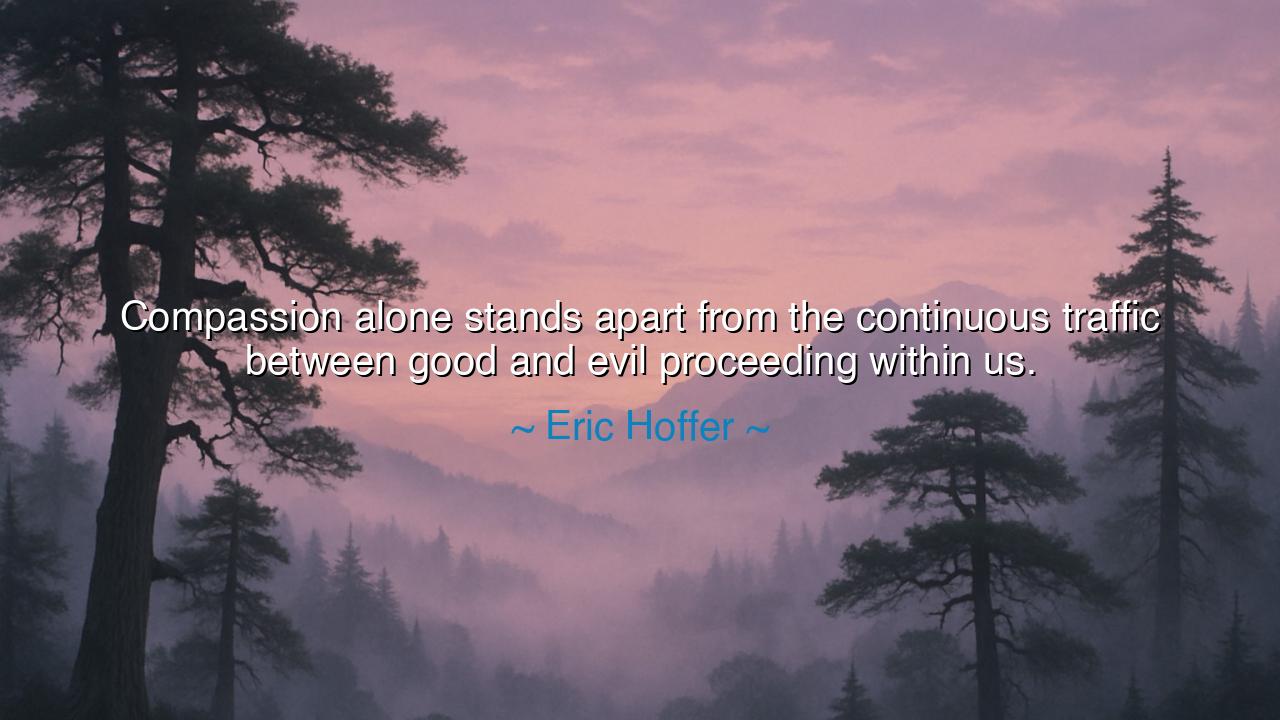
Compassion alone stands apart from the continuous traffic between
Compassion alone stands apart from the continuous traffic between good and evil proceeding within us.






When Eric Hoffer, the longshoreman-philosopher, wrote, “Compassion alone stands apart from the continuous traffic between good and evil proceeding within us,” he cast light upon the most sacred mystery of the human heart. In those few words, he revealed that while all our thoughts and deeds — even those done in the name of virtue — may still be entangled in selfish desire, compassion is the one act of purity that transcends the endless struggle of the soul. For within every human being there rages a silent battle between good and evil, a ceaseless motion of intention and temptation. Yet compassion — the quiet reaching out toward another’s suffering — flows not from pride or ambition, but from the wellspring of something divine.
Hoffer was not a priest nor a scholar cloistered in ivory towers; he was a man who labored among the docks, who saw life in its raw and unvarnished form. He saw men quarrel over wages, saw hatred bloom in the hungry, saw greed and resentment poison the spirit. And through these observations, he came to know that even good deeds are often touched by self-interest — we do good to be praised, to be relieved of guilt, or to feel righteous in our own eyes. But compassion — true compassion — arises when the heart forgets itself entirely. It is the one impulse untouched by calculation. It asks for nothing. It simply moves toward pain as light moves toward darkness.
The ancients spoke of this truth in different tongues. The Buddha called it karuṇā, the boundless sympathy that sees all beings as one in suffering. The early Christians named it agape, love without condition, without measure, without hope of return. In both, the lesson is the same: compassion is not born from the struggle of good against evil, but from a realm beyond it — the realm of grace. For the good man still thinks of virtue and reward, but the compassionate man does not think at all; he simply feels the cry of another soul as if it were his own. And in that moment, he becomes free from the chains of judgment, pride, and fear.
Think of Mother Teresa, who walked through the streets of Calcutta, gathering the dying from gutters and the lepers from shadows. She did not ask if they were righteous or wicked, deserving or undeserving. She saw only their pain, and in her heart that pain became her own. In such acts, the duality of good and evil dissolves. There is no enemy, no sinner, no saint — only life in its frail and holy form. That is why Hoffer said compassion stands apart. It is the single virtue that escapes the war within us, the one act that belongs wholly to heaven though it is born in the heart of man.
Yet how difficult it is to dwell in that state! For we are creatures torn by judgment. We divide the world — this is good, that is bad; this is worthy, that is vile. Even when we help others, we often measure our goodness against their need. Thus, compassion is not our natural state; it must be cultivated, like a delicate flower in the soil of humility. To feel compassion is to step beyond the self, to silence the inner voices that demand reward or justice, and simply to see the suffering before us as part of ourselves. It is to recognize, as the wise have long known, that there is no "other" — there is only one shared existence, one breath passing through countless forms.
In every age, there are those who have glimpsed this truth. Abraham Lincoln, during the bloodiest war of his nation, spoke with mercy even toward those who sought his death. When asked why he did not treat the Confederates as enemies, he said, “Do I not destroy my enemies when I make them my friends?” That was compassion — not weakness, but strength born from understanding. For compassion does not excuse evil; it transcends it. It breaks the cycle of vengeance by refusing to participate in the traffic of hatred and retribution.
So, my children, if you would live wisely, cultivate compassion above all virtues. Do not seek to be merely “good,” for good and evil are but two sides of the same coin, turning endlessly in the hand of fate. Instead, learn to feel — to see the divine spark in every creature, even those who wound you. Let your heart become large enough to hold both sorrow and forgiveness. When you see another’s pain, do not analyze or compare; act as love would act — immediately, without thought.
For in that moment, you will stand where angels walk: beyond the endless traffic of good and evil, in the still, radiant space where compassion alone reigns. And there, in that timeless silence, the soul touches eternity — not through conquest, not through piety, but through the simple, unguarded act of mercy.






AAdministratorAdministrator
Welcome, honored guests. Please leave a comment, we will respond soon